In the rapidly evolving world of commercial landscaping, integrating artificial intelligence (AI) and drones is reshaping the industry, offering unprecedented levels of efficiency, precision, and overall landscape management. This technological revolution is particularly evident in British Columbia, where several companies and projects have embraced these innovations to transform their operations. This blog will explore how AI and drones revolutionize commercial landscaping, highlighting specific examples, benefits, challenges, and future trends.
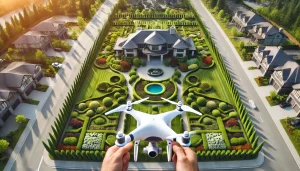
Enhancing Efficiency and Precision
AI and drones are revolutionizing commercial landscaping by enhancing efficiency and precision in various tasks. AI-powered software can analyze vast amounts of data to optimize irrigation schedules, predict plant health issues, and recommend the best maintenance practices. Drones, equipped with advanced sensors and cameras, can perform aerial surveys, monitor plant health, and even assist in precision spraying of fertilizers and pesticides.
Example 1: GreenTech Landscaping, Vancouver GreenTech Landscaping in Vancouver has integrated AI-driven software to manage irrigation systems. The software optimizes irrigation schedules by analyzing weather data, soil moisture levels, and plant water needs, reducing water usage by up to 30%. This not only conserves water but also ensures healthier landscapes.
Example 2: AerialScape, Victoria AerialScape, a Victoria-based company, uses drones for aerial mapping and monitoring of large commercial properties. These drones capture high-resolution images and use AI to detect pest infestations, nutrient deficiencies, and irrigation problems. This allows for timely interventions and reduces the need for manual inspections, saving time and labour costs.
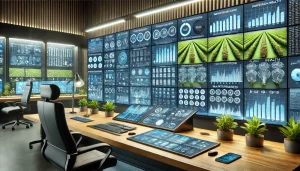
Real-World Applications and Benefits
The practical applications of AI and drones in commercial landscaping are vast and varied. From precision mowing and planting to automated pest control, these technologies offer numerous benefits, including:
- Sustainability: AI and drones help reduce water use, fertilizers, and pesticides by optimizing their application, contributing to more sustainable landscaping practices.
- Cost Savings: Companies can significantly reduce operational costs by improving efficiency and reducing labour-intensive tasks.
- Improved Customer Satisfaction: AI and drones’ precision and consistency result in healthier, well-maintained landscapes and higher customer satisfaction.
Example 3: SmartScape Solutions, Kelowna SmartScape Solutions in Kelowna has adopted AI-powered automated lawn mowers. These mowers use machine learning algorithms to navigate landscapes efficiently, ensuring a uniform cut while avoiding obstacles. The result is a perfectly manicured lawn with minimal human intervention.
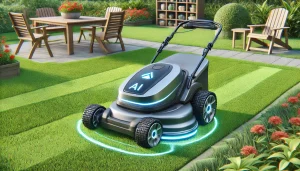
Challenges and Drawbacks
Integrating AI and drones in commercial landscaping comes with challenges despite the numerous benefits. The initial investment in technology and training can be high, and there may be resistance from traditional landscapers accustomed to manual methods. Additionally, regulatory and environmental considerations specific to British Columbia, such as drone usage regulations and environmental impact assessments, must be addressed.
Example 4: EcoLandscapes, Surrey EcoLandscapes in Surrey faced challenges when first implementing drones for aerial surveys. Navigating the regulatory landscape required obtaining special permits and ensuring compliance with local drone laws. However, once these hurdles were overcome, the benefits of increased efficiency and improved landscape management became evident.
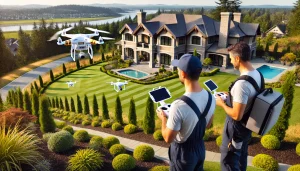
Future Trends and Predictions
The future of AI and drones in commercial landscaping looks promising, with continuous technological advancements and increasing adoption rates. In British Columbia, we can expect more companies to integrate AI-driven analytics and drones into their operations, leading to smarter, more sustainable landscaping practices.
Example 5: FutureScape Innovations, Richmond FutureScape Innovations in Richmond explores using AI-powered robots to plant and maintain large garden beds. These robots can analyze soil conditions, select the appropriate plants, and ensure optimal spacing and depth, revolutionizing large-scale planting projects.
AI and drones are transforming the commercial landscaping industry in British Columbia, offering significant improvements in efficiency, precision, and sustainability. While challenges exist, the benefits far outweigh the drawbacks, making these technologies valuable to any landscaping operation. As more companies embrace these innovations, the future of commercial landscaping looks brighter and more technologically advanced than ever.
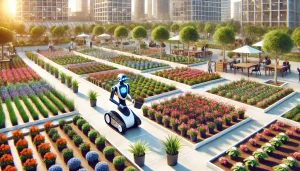
For landscaping professionals and business owners, now is the time to explore the potential of AI and drones. By integrating these technologies into your operations, you can stay ahead of the competition, reduce costs, and deliver exceptional client results.